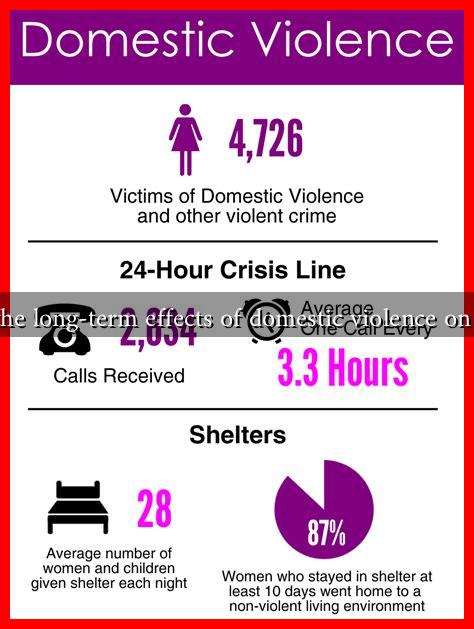-
Table of Contents
What are the Long-Term Effects of Domestic Violence on Survivors?
Domestic violence is a pervasive issue that affects millions of individuals worldwide, transcending age, gender, and socioeconomic status. While the immediate physical injuries are often visible, the long-term effects of domestic violence on survivors can be profound and far-reaching. This article explores the various dimensions of these long-term effects, including psychological, physical, and social consequences, supported by relevant statistics and case studies.
The Psychological Impact of Domestic Violence
One of the most significant long-term effects of domestic violence is psychological trauma. Survivors often experience a range of mental health issues, including:
- Post-Traumatic Stress Disorder (PTSD): Many survivors develop PTSD, characterized by flashbacks, severe anxiety, and uncontrollable thoughts about the traumatic event.
- Depression: A significant number of survivors report feelings of hopelessness, worthlessness, and persistent sadness.
- Anxiety Disorders: Survivors may experience chronic anxiety, panic attacks, and a heightened sense of fear.
- Low Self-Esteem: Continuous emotional abuse can lead to a diminished sense of self-worth and confidence.
According to the National Coalition Against Domestic Violence (NCADV), approximately 1 in 4 women and 1 in 9 men experience severe intimate partner physical violence, which can lead to long-term psychological effects. A study published in the Journal of Interpersonal Violence found that survivors of domestic violence are 15 times more likely to experience PTSD than those who have not experienced such trauma.
Physical Health Consequences
The physical repercussions of domestic violence can persist long after the abuse has ended. Survivors may face:
- Chronic Pain: Many survivors report ongoing pain conditions, including headaches, back pain, and gastrointestinal issues.
- Cardiovascular Problems: Stress and trauma can lead to increased risks of heart disease and hypertension.
- Reproductive Health Issues: Survivors may experience complications such as unintended pregnancies, sexually transmitted infections, and gynecological problems.
- Substance Abuse: Some survivors turn to drugs or alcohol as a coping mechanism, leading to addiction and further health complications.
A study by the World Health Organization (WHO) indicates that women who experience intimate partner violence are 1.5 times more likely to acquire HIV and other sexually transmitted infections. This highlights the critical need for comprehensive healthcare services for survivors.
Social and Economic Consequences
The effects of domestic violence extend beyond the individual, impacting families and communities. Survivors often face:
- Isolation: Abusers frequently isolate their victims from friends and family, leading to a lack of social support.
- Employment Challenges: Survivors may struggle to maintain employment due to physical injuries, mental health issues, or the need to relocate for safety.
- Financial Instability: The economic impact of domestic violence can be severe, with many survivors facing poverty and homelessness.
- Impact on Children: Children who witness domestic violence are at risk for emotional and behavioral issues, perpetuating the cycle of violence.
According to a report by the Institute for Women’s Policy Research, survivors of domestic violence lose an estimated 8 million days of paid work each year, which is equivalent to the annual output of 32,000 full-time jobs.
Case Studies and Real-Life Examples
Numerous case studies illustrate the long-term effects of domestic violence. For instance, a survivor named Sarah, who endured years of emotional and physical abuse, reported that even after leaving her abuser, she struggled with anxiety and depression, which affected her ability to maintain relationships and employment. Her story is not unique; many survivors face similar challenges.
Another case is that of John, a male survivor who faced stigma and isolation after leaving an abusive relationship. His experience highlights the need for inclusive support systems that address the needs of all survivors, regardless of gender.
Conclusion
The long-term effects of domestic violence on survivors are complex and multifaceted, encompassing psychological, physical, and social dimensions. Understanding these effects is crucial for developing effective support systems and interventions. Survivors often face ongoing challenges that require comprehensive care, including mental health services, medical treatment, and social support. By raising awareness and advocating for resources, we can help mitigate the long-term consequences of domestic violence and support survivors on their journey to recovery.
For more information on domestic violence and available resources, visit the National Coalition Against Domestic Violence.

